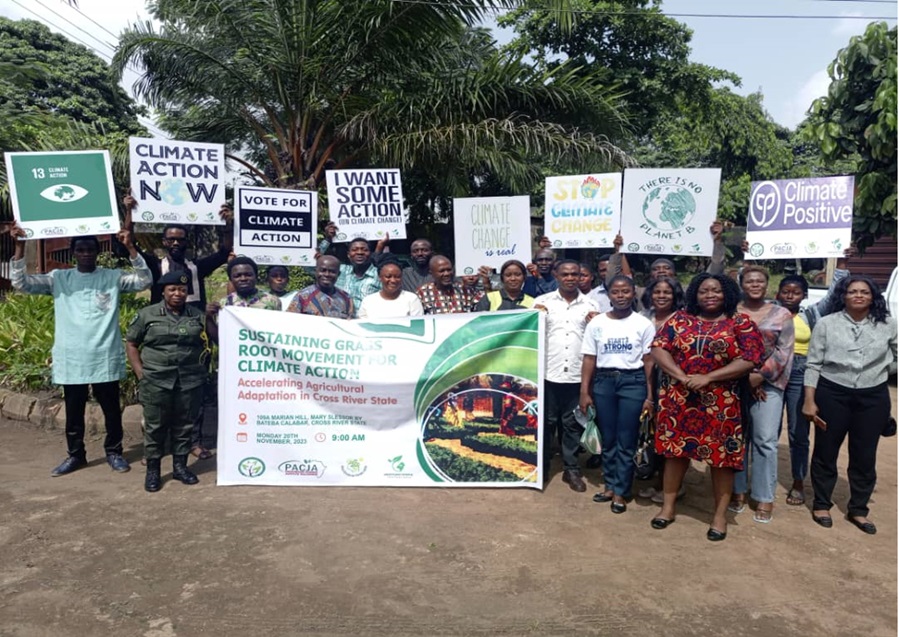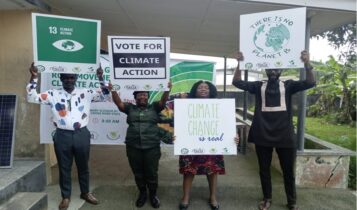
Reported by Doose Hannu Johanna
In Commemoration of the Global week of climate change activism, the Climate and sustainable Development Network (CSDevNet) under the African Activists for Climate Justice (AACJ) project in collaboration with the Green planet initiative organised a training workshop on “sustaining grass root movement for climate action; accelerating Agricultural adaptation” which was held on Monday 21st November 2023 at Marian hill Mary Slessor Calabar, Cross River, State.
The workshop, brought together (50) stakeholders, including, policymakers, Civil Society Organizations (CSOs), NGOs, private organisations, and farmers. Participants encompassed, including men, women and youths. The central focus of the discussions was on sustaining grassroots movements for climate action and accelerating agricultural adaptation.
One of the specific objectives of the workshop was aimed at addressing the challenges posed by climate change through building capacity and knowledge for Civil Society Organizations (CSOs) and relevant stakeholders to effectively tackle the impacts of climate change.
This involved ensuring sustainability through policy and regulatory reforms at both the national and sub-national levels.
Additionally, it aimed at fostering cooperation among stakeholders and strengthen the means of implementation to revitalize the global partnership for sustainable development.
These objectives were discussed and deliberated upon by the diverse group of participants, with a shared commitment to promoting sustainable practices and addressing the pressing issues related to climate change in the region.
Mr. Godwin Ugah, the South-South coordinator, extended a gracious welcome to all workshop participants. Expressing deep appreciation, he thanked the Climate and Sustainable Development Network for their pivotal support in making the workshop a reality.

Mr. Ugah highlighted how the Network has been an instrumental in ensuring that the advocacy for climate change reaches states, local communities, and grassroots levels, especially in the South-South region of Nigeria
Professor Elizabeth Andrew Essien, a distinguished figure in the field of agriculture, addressed the pressing need for agricultural adaptation to climate change.
She added“ The future of the earth is ours, so take good care of the unborn and let us come together and underscored the critical importance of implementing innovative strategies to overcome key challenges in agriculture” she added
In her concluding statements, Professor Essien urged for continued innovation and collaboration among stakeholders. She opened the floor for discussions on future directions, emphasizing the dynamic nature of adaptation in the agricultural landscape
Mr. Obongha Oghuni, an advocate for environmental sustainability, has drawn attention to the critical environmental challenges facing the Cross River Region. His remarks shed light on the pressing need for immediate action to mitigate the impacts of climate change on the community.
“Cross River Region is at a critical juncture, facing unprecedented environmental challenges that demand our immediate attention. The windstorms, erratic rain patterns, and coastal flooding experienced in recent years underscore the urgency of addressing climate change. Our agricultural sector, a lifeline for many, is bearing the brunt. It’s time for proactive responses.” He said
Mr. Oguni emphasized the immediate need for proactive responses, particularly in accelerating agricultural adaptation strategies to build resilience against a changing climate. The challenges faced by the community require immediate attention to safeguard livelihoods and ensure sustainable development.
Recommendations and challenges highlighted by participants include;
- Nigeria should prioritize inclusion of multiple stakeholders such as private sector and civil society in renewable energy initiatives and programs. This inclusion will minimise the probability of leaving out vital issues and foster cooperation in addressing Renewable energy development across various levels of governance
- Civic society engagement should be more proactive in engaging government and policy makers to mitigate deforestation and environmental degradation challenges in Cross River State
- Government should make plans to replace transformers in wards and grassroots to accommodate the new technology and also support them with solar kits
- There is a need to rethink livelihood opportunities for communities whose real means of living is forest activities
- Cross river state should have state action plan on environment and more for sustainable societies to be achieved
- The proceeds from climate investment funds should get to the right persons involved
- COP28 should advocate strategies to provide renewable energy sources to affected rural communities
- The government should fulfill commitment in implementing climate change and the process of CSOs to access funds should be simplified
In Conclusion, Mr. Godwin passionately called on everyone to unite in the fight against climate change.
The participants echoed this sentiment by displaying placards bearing messages such as ‘Climate Action,’ ‘Vote for Climate Action,’ ‘Climate Positive,’ ‘I Want Some Action,’ ‘Stop Climate Change,’ and ‘Climate Change Is Real,’ among other powerful inscriptions.
